DOWNLOAD NEWS 2013/15
Brian Wilson
DL News 2013/14 is here and the index of earlier editions is here.
There are two important fortieth birthdays to celebrate.
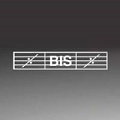
For their 40th birthday BIS are running a special offer – 40% off
40 of their best-known albums for 40 days. I often have to say of a
particular BIS offer from eclassical.com that it will have ended by
the time that you read my review, but that I advise checking out whatever
the current offers are – there’s always at least one. This
time I need not add anything to discourage you if you’re quick:
go to http://www.eclassical.com/pages/bis-records-40-years.html and there’s bound to be something to interest you. With the festive
season approaching, for example, why not go for Emma Kirkby’s concert
of Christmas Music (BIS-CD-1135 – review and DL
Roundup December 2011/2) for just $5.83 in mp3 and lossless flac?
There is also a 40-track sampler: 3 hours and 40 minutes for $7.99.
 The
Tallis Scholars, also 40, have re-recorded the Taverner Missa Gloria
Tibi Trinitas for their own label, Gimell, this time with three
settings of the Magnificat as couplings – see below for
this Recording of the Month.
The
Tallis Scholars, also 40, have re-recorded the Taverner Missa Gloria
Tibi Trinitas for their own label, Gimell, this time with three
settings of the Magnificat as couplings – see below for
this Recording of the Month.
Naxos
This month it’s the turn of Naxos in need of some catching up.
Click on the catalogue numbers for links to downloads from classicsonline.com
or stream from Naxos Music Library.
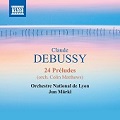 9.702915:
Claude DEBUSSY (1862-1918) Préludes, Books I and II
(orch. Colin MATTHEWS): [85:17]. Click on the catalogue number
for a link to the classicsonline.com download (mp3 only) or stream from Naxos Music Library (both with pdf
booklet). There’s another Jun Märkl recording of these two
books of Préludes for Naxos, in the Peter Breiner orchestration,
with the Royal Scottish National Orchestra (8.572584 – review and review).
This is a download-only release of the versions with the Lyon National
Orchestra, previously contained in the 9-CD box set where they are spread
across two discs.
9.702915:
Claude DEBUSSY (1862-1918) Préludes, Books I and II
(orch. Colin MATTHEWS): [85:17]. Click on the catalogue number
for a link to the classicsonline.com download (mp3 only) or stream from Naxos Music Library (both with pdf
booklet). There’s another Jun Märkl recording of these two
books of Préludes for Naxos, in the Peter Breiner orchestration,
with the Royal Scottish National Orchestra (8.572584 – review and review).
This is a download-only release of the versions with the Lyon National
Orchestra, previously contained in the 9-CD box set where they are spread
across two discs.
You pay your money and take your pick as between the Matthews and Breiner
orchestrations; Matthews tends to be more colourful, Breiner closer
to the piano originals. I’ve no strong opinions either way; in 2012/20, à propos of the Breiner, I recommended staying with the
keyboard versions, specifically with Angela Hewitt on Hyperion CDA67898.
I didn’t listen to Ms Hewitt for comparison this time, which is
perhaps why I enjoyed these orchestrated versions more – but as
adjuncts, not as replacements.
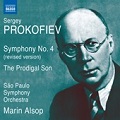 8.573186:
Sergei PROKOFIEV Symphony No.4 (revised version), Op.112, and The
Prodigal Son, Op.46, played by the São Paulo Symphony Orchestra
conducted by Marin Alsop – from classicsonline.com (mp3, with pdf booklet) [78:12]. This recording replaces an earlier
Naxos album with the same coupling from the Ukraine National SO and
Theodore Kuchar. The Fourth, drawn largely from the ballet with which
it’s coupled on both these recordings, is not one of Prokofiev’s
greater works but all concerned here make a good case for it. The download
is mp3 only at the time of writing; I downloaded too soon for the lossless
version, which is now available – what happened to the policy of
making mp3 and flac available simultaneously? – but it sounds well.
8.573186:
Sergei PROKOFIEV Symphony No.4 (revised version), Op.112, and The
Prodigal Son, Op.46, played by the São Paulo Symphony Orchestra
conducted by Marin Alsop – from classicsonline.com (mp3, with pdf booklet) [78:12]. This recording replaces an earlier
Naxos album with the same coupling from the Ukraine National SO and
Theodore Kuchar. The Fourth, drawn largely from the ballet with which
it’s coupled on both these recordings, is not one of Prokofiev’s
greater works but all concerned here make a good case for it. The download
is mp3 only at the time of writing; I downloaded too soon for the lossless
version, which is now available – what happened to the policy of
making mp3 and flac available simultaneously? – but it sounds well.
You may wish to complement this recording of the revised version with
Neeme Järvi’s of the original (1930), coupled with the Third
Symphony (Chandos CHAN8401). Järvi’s recording of the
revised version comes on CHAN8400 and both versions are included
in the box set of his recordings of all the symphonies (CHAN10500 (4)).
Leslie Wright was less impressed with Marin Alsop’s recording of
the Fifth, though he enjoyed the coupling, The Year 1941 (8.573029 – review).
For my discussion of alternative versions of the Fifth, including Järvi,
see DL
News 2012/20.
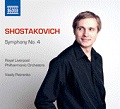 8.573188:
Dmitri SHOSTAKOVICH Fourth Symphony in c minor, Op.43 [64:59], is
a more substantial work than the Prokofiev, though highly controversial
in its time. This is the latest volume (No.9) in Vasily Petrenko’s
cycle with the Royal Liverpool Phil.
8.573188:
Dmitri SHOSTAKOVICH Fourth Symphony in c minor, Op.43 [64:59], is
a more substantial work than the Prokofiev, though highly controversial
in its time. This is the latest volume (No.9) in Vasily Petrenko’s
cycle with the Royal Liverpool Phil.
Though completed in 1936, the work was withdrawn following Stalin’s
bad-tempered reaction to Lady Macbeth and not performed until
1961. It’s easy for us now to see that the music was a protest
against the harshness of life under the Soviet regime, an aspect which
Dan Morgan thought lacking in this recording – Shostakovich-lite: review – though he expected others to be more impressed.
So far I haven’t seen any other reactions but the opening is certainly
spikey enough for someone like me who first got to know the work from
Eugene Ormandy’s CBS recording (72129 and reissued on 61696) and,
more recently, from an Olympia reissue of Gennadi Rozhdestvensky’s
1985 Melodiya recording with the USSR Ministry of Culture SO (OCD156
– sadly, no longer available*, though the 1962 recording still
is, on BBC Legends). Ormandy emphasised the Mahlerian aspects of the
work. I don’t hear more than an occasional hint of Mahler from
Petrenko, but I did think that he developed the harshness of the music
more than Dan Morgan gives him credit for. Once again I was too early
for the lossless flac from classicsonline.com, but the mp3 is good.
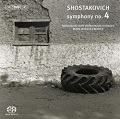 Regular
readers will know that I usually agree with Dan, but I did find more
in this Shostakovich Four than he did and I could happily live with
it. Try it for yourself if you can from Naxos Music Library – short
snippets won’t do it, I think – or go for a version that we
both like very much:
Regular
readers will know that I usually agree with Dan, but I did find more
in this Shostakovich Four than he did and I could happily live with
it. Try it for yourself if you can from Naxos Music Library – short
snippets won’t do it, I think – or go for a version that we
both like very much:
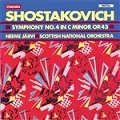
BIS-SACD-1553: Netherlands Radio PO/Mark Wigglesworth [65:37] – follow link from
catalogue number to eclassical.com (mp3, 16– and 24-bit lossless,
with pdf booklet). You can stream this, too, from Naxos Music Library.
At $9.84 (mp3 and 16-bit lossless) it’s not much more expensive
than the Petrenko and less expensive than Järvi (below), thanks
to eclassical.com’s per-second pricing, with 24-bit only a little
more. Even the dismal unloved scene on the cover fits the bill.
Alternatively: CHAN8640:
another powerful performance, from the Royal Scottish National Orchestra/Neeme
Järvi [61:07]. Follow link from catalogue number to theclassicalshop.net
(mp3 and lossless, with pdf booklet).
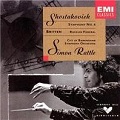 Simon
Rattle’s recording is also well worth considering – it’s
available from sainsburysentertainment.com for a ridiculously inexpensive £0.89, so it’s well worth
having as a second version. The second movement is seriously mis-labelled
as Russian Funeral, actually the title of the Britten filler
on track 4, and I had some problems with getting this download from
the download manager but an email to Sainsburys’ customer services
brought speedy redress in the form of tracks which could be downloaded
directly.
Simon
Rattle’s recording is also well worth considering – it’s
available from sainsburysentertainment.com for a ridiculously inexpensive £0.89, so it’s well worth
having as a second version. The second movement is seriously mis-labelled
as Russian Funeral, actually the title of the Britten filler
on track 4, and I had some problems with getting this download from
the download manager but an email to Sainsburys’ customer services
brought speedy redress in the form of tracks which could be downloaded
directly.
* Someone really should reissue all those Olympia/Melodiya recordings
– even the over-lit sound is appropriate to the music and they
were mostly more generously coupled than the new Naxos, the BIS or the
Chandos, with Jazz Suite No.1 on the CD with the Fourth Symphony.
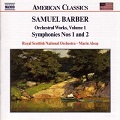 8.559024:
Samuel BARBER (1910-1981): The School for Scandal Overture,
Op.5 [8:42]; First Essay for Orchestra, Op.12 [8:20]; Symphony No.1,
Op.9 [21:44]; Symphony No.2, Op.19 [30:59]: Royal Scottish National
Orchestra/Marin Alsop [69:45]. Mp3 or stream from Naxos Music Library
(both with pdf booklet). Adrian Smith wrote: Performance and recording
are first class and this disc is a ‘must’ for anyone who enjoys
late-romantic music with something new to say – review – and John Phillips awarded a full five stars – review;
only Colin Clarke was a little less enthusiastic – review.
With good mp3 sound, this will do very nicely unless you must have the
lossless sound on the Chandos recording of both symphonies, the School
for Scandal Overture and the ever-popular Adagio which Colin
Clarke preferred and with which I’d be equally happy (CHAN9684:
Detroit SO/Charles Dutoit [68:12] – from theclassicalshop.net,
mp3 and lossless, with pdf booklet).
8.559024:
Samuel BARBER (1910-1981): The School for Scandal Overture,
Op.5 [8:42]; First Essay for Orchestra, Op.12 [8:20]; Symphony No.1,
Op.9 [21:44]; Symphony No.2, Op.19 [30:59]: Royal Scottish National
Orchestra/Marin Alsop [69:45]. Mp3 or stream from Naxos Music Library
(both with pdf booklet). Adrian Smith wrote: Performance and recording
are first class and this disc is a ‘must’ for anyone who enjoys
late-romantic music with something new to say – review – and John Phillips awarded a full five stars – review;
only Colin Clarke was a little less enthusiastic – review.
With good mp3 sound, this will do very nicely unless you must have the
lossless sound on the Chandos recording of both symphonies, the School
for Scandal Overture and the ever-popular Adagio which Colin
Clarke preferred and with which I’d be equally happy (CHAN9684:
Detroit SO/Charles Dutoit [68:12] – from theclassicalshop.net,
mp3 and lossless, with pdf booklet).
There’s a lossless version of the Naxos from eclassical.com but,
at $12.56, that’s more expensive even than the CD. At the other
end of the spectrum, those looking for a bargain should check out Leon
Botstein with the American Symphony Orchestra on their in-house label
– subscribers to emusic.com can have this in decent mp3 for £0.42
or less.
Recording of the Month
 John
TAVERNER (c.1490-1545)
John
TAVERNER (c.1490-1545)
Missa Gloria tibi Trinitas [41:21]
Magnificat for four voices [11:04]
Magnificat for five voices [13:23]
Magnificat for six voices [13:13]
The Tallis Scholars/Peter Phillips – rec. Merton College Chapel,
Oxford, 2013. DDD.
Pdf booklet with texts and translations included
GIMELL CDGIM045 [79:03] – from gimell.com (mp3 and various 16– and 24-bit lossless formats) or hyperion-records-co.uk (mp3, 16/44.1, 24/96 and 24/176.4)
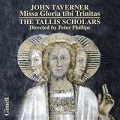 To
celebrate their 40th anniversary in November 2013 Peter Phillips and
his team have chosen to revisit one of their earlier successes, the
Taverner Missa Gloria tibi Trinitas, ‘a summation of Taverner’s
art as well as our own’ as he puts it.
To
celebrate their 40th anniversary in November 2013 Peter Phillips and
his team have chosen to revisit one of their earlier successes, the
Taverner Missa Gloria tibi Trinitas, ‘a summation of Taverner’s
art as well as our own’ as he puts it.
Let’s be clear that the earlier 1984 recording of the Mass on CDGIM004,
recorded like its successor in Merton College Chapel, remains one of
the high points of the Scholars’ remarkable achievement and the
coupling, the Western Wind Mass and the Easter respond Dum
transisset Sabbatum, make that still much more than a historical
curiosity, with the kind of performances that only a few ensembles have
been able to rival since. I shan’t be disposing of my ancient copy
of that disc, though the Western Wind Mass from it has been reissued
in a less expensive 2-for-1 collection of Tudor music on CDGIM209 – Bargain of the Month: review – thus clearing the way for the new release, the Benedictus from which was foreshadowed in another inexpensive twofer, Renaissance
Radio, CDGIM212, earlier this year – Recording
of the Month: review and DL
News2013/3.
It’s almost superfluous at this late date to comment on the style
of the Tallis Scholars. Regular listeners to their output will not be
surprised to learn that Peter Phillips’ tempi have broadened noticeably
in the interim, with the concluding Agnus Dei, for example, now
taking 9:39 as against the earlier 7:59, which was already slightly
more deliberate than Paul Hillier’s 7:44 (with Ars Nova, DaCapo 8.226056 – review).
Stephen Darlington with Christ Church Cathedral Choir – from next
door, but actually recorded in Merton College chapel, where both Gimell
recordings were made – had already made a case for slower tempi
(Avie AV2123 – review).
Darlington takes the Gloria even more slowly: 12:56 against 9:47
(Hillier), 10:25 (Phillips 1984) and 11:45 (Phillips 2013) but the miracle
is that all these recordings are so good in their own terms that they
all sound right unless you start making direct comparisons. The daCapo
may sound a little more ‘exciting’, the Avie a little more
deliberate than either Gimell recording, but any one of these would
serve superbly to lift the hearer’s soul, into a better place.
If there’s anything that I’ve learned about tempi, especially
in music of this period, it’s that they are only relative. Peter
Phillips now paces the Mass more deliberately than he did in 1984, yet
that earlier version in no way sounds hurried, nor does the new sound
slow.
To these fine recordings I should add The Sixteen under Harry Christophers
– a splendid bargain at £4.99 (mp3 or flac) on Hyperion Helios
CDH55052, with Audivi vocem, and an even better bargain in a
budget box set of English polyphonic music (CDS44401/10 – review and Bargain of the Month review;
download in mp3 or flac for £40.). The Tallis Scholars tend nowadays
to adopt slower tempi than The Sixteen, but in 1984 when they both recorded
the Taverner Mass the boot was on the other foot: Christophers takes
nine minutes longer than Phillips Mark I and even three minutes longer
than Phillips Mark II, with a Gloria which clocks in as the second
longest of the four under consideration, yet, nonetheless, still sounds
glorious. (12:29, but that includes the short respond Gloria tibi
Trinitas; Darlington takes 12:56, Phillips 2013 11:45, Phillips
1984 10:26, Hillier 9:47).
Darlington offers the advantage of prefacing the Mass with an extended
‘farced’ Kyrie; Tudor composers often did not set this section
polyphonically, presumably expecting it to be chanted, but the arrangement
on the Avie recording works well, as did that on the earlier Gimell
recording where the Mass is preceded by Taverner’s Kyrie Leroi.
To have repeated that would have put the new recording over 80 minutes
– perhaps it could have been included as a bonus with the download.
Christophers prefaces the Gloria with the Vespers respond Gloria
tibi Trinitas which forms the cantus firmus – not something
which could have happened in liturgical practice, but effective.
There are recordings of the 4-part Magnificat on Hyperion (CDH55053 and CDS44401/10) and New York Polyphony (Avie AV2186);
Christ Church have recorded the 5-part (Nimbus NI5360 – review)
but this seems to be the only recording of the six-part work, and of
all three in the same programme. Unsurprisingly, The Tallis Scholars
take the music at a slowish pace but not one that ever drags and these
three items add to the appeal of the new recording.
Subscribers to Naxos Music Library can compare the earlier Gimell, the
Ars Nova and Avie recordings of the Mass there. I shall not be ditching
any of the other recordings that I’ve mentioned, having just listened
to them all practically continuously over several days with no sense
of satiation, but I’ll certainly be listening regularly to the
new recording – I hope for as long as I’ve been listening
to the two recordings from 1984.
Giovanni Pierluigi da PALESTRINA (1525/6-1594) Music for Pentecost
Dum complerentur [6:11]
Missa dum complerentur [29:40]
Veni Sancte Spiritus [3 settings: 2:20 + 2:23 + 4:14]
Veni Creator Spiritus [8:53]
Magnificat sexti toni [13:41]
Spiritus Sanctus replevit totam domum [3:39]
Westminster Cathedral Choir/Martin Baker – rec. March 2002. DDD.
Pdf booklet with texts and translations included
HYPERION HELIOS CDH55449 [71:01] – from hyperion-records.co.uk (mp3 and lossless)
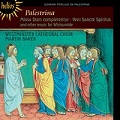 I
thought I had covered all the Hyperion recordings of Palestrina from
Westminster Cathedral in one form or another, but I seem to have missed
this one in its full-price incarnation. It’s the wrong time of
year, of course, for music for Pentecost (Whitsun) but the budget-price
reissue is very welcome in every other respect.
I
thought I had covered all the Hyperion recordings of Palestrina from
Westminster Cathedral in one form or another, but I seem to have missed
this one in its full-price incarnation. It’s the wrong time of
year, of course, for music for Pentecost (Whitsun) but the budget-price
reissue is very welcome in every other respect.
The only alternative recording of Palestrina’s Pentecost Mass widely
available in the UK comes from Christ Church Cathedral Choir, Oxford
(Nimbus NI5100 – from classicsonline.com (mp3 only) or on CD, which Robert Hugill regarded rather as a fine example
of the English Cathedral tradition – review – available from MusicWeb International, currently £12 post
paid – here.
The Nimbus brings happy memories of hearing the Christ Church choir
sing Palestrina as an undergraduate but in all other respects –
including, now, price, the Hyperion is preferable.
Luca MARENZIO (1553-1599)
Primo Libro di Madrigali a cinque voci (1580)
Dolci Affetti (1582) Sestina: Mentre ti fui si grato
Primo fiore della ghirlanda musicale (1577): Donna bella e
crudel (reconstructed by James Chater)
La Compagnia del Madrigale – rec. 2010 and 2011. DDD.
pdf booklet with texts and translations included
GLOSSA GCD922802 [67:29] – from classicsonline.com (mp3) or stream from Naxos Music Library
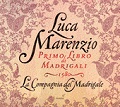
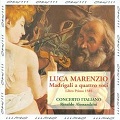 Thoroughly
delectable music, excellently performed and recorded. If you know Monteverdi’s
madrigals but have yet to encounter Marenzio, you should not hesitate.
This is my second encounter with la Compagnia de Madrigale; if anything
I was even more impressed than with their earlier Glossa recording of
Gesualdo – DL
News 2013/8. In Marenzio they take more time to let the music breathe
and add more colour than the sparser-sounding Concerto Vocale (Harmonia
Mundi, below).
Thoroughly
delectable music, excellently performed and recorded. If you know Monteverdi’s
madrigals but have yet to encounter Marenzio, you should not hesitate.
This is my second encounter with la Compagnia de Madrigale; if anything
I was even more impressed than with their earlier Glossa recording of
Gesualdo – DL
News 2013/8. In Marenzio they take more time to let the music breathe
and add more colour than the sparser-sounding Concerto Vocale (Harmonia
Mundi, below).
Classicsonline.com and Naxos Music Library also offer the very fine
Naïve/Op.111 recording of Marenzio’s First (and only) Book
of 4-part madrigals (1585), Concerto Italiano/Rinaldo Alessandrini in
mp3, OP30117, which eclassical.com also offer in mp3 and lossless for around the same price, making
that the better buy. Neither of these comes with the booklet of texts,
however. Alessandrini’s award-winning selection of madrigals from
Marenzio’s 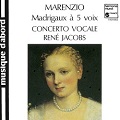 various
collections seems to have disappeared from separate availability but
comes in an inexpensive 2-CD set with the 4-part works and a book (NC40010).
various
collections seems to have disappeared from separate availability but
comes in an inexpensive 2-CD set with the 4-part works and a book (NC40010).
There’s just one copy left for sale at amazon.co.uk as I write
of the Concerto Vocale/René Jacobs 1981 selection of Marenzio’s
5-part madrigals (Harmonia Mundi HMA1901065) and the seller is
asking £34.99 for what was a budget-price release, so the eclassical.com download (mp3 and lossless) is good value at $8.74, reflecting the short
playing time (48 minutes). Once again, however, there’s no booklet.
Johann Sebastian BACH (1685-1750)
 Christmas
Oratorio, BWV248
Christmas
Oratorio, BWV248
Katherine Watson (soprano); Iestyn Davies (counter-tenor); James Gilchrist
(tenor); Matthew Brook (bass)
Trinity College Choir, Cambridge
Orchestra of the Age of Enlightenment/Stephen Layton – rec. January
2013. DDD.
pdf booklet with texts and translations included
HYPERION CDA68031/2 [2 CDs: 151:46] – from hyperion-records.co.uk (mp3, 16– and 24-bit lossless)
This is one of Stephen Layton’s and Hyperion’s regular Christmas
presents, joining their Britten Ceremony of Carols and St
Nicolas from last year, Handel’s Messiah (2009) and
Rutter’s Christmas music, to name just some of the highlights.
Sample some of the earlier offerings inexpensively on A Christmas
Present from Polyphony (NOEL2)
and Christmas through the Ages (NOEL1).
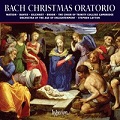 Competition
in the Christmas Oratorio is strong, not least from:
Competition
in the Christmas Oratorio is strong, not least from:
• BIS-CD-941/2: Masaaki Suzuki. Though recorded before most
of the cantatas which have been so widely praised, this recording shares
the virtues of that series – indeed, the so-called Oratorio is
actually a collection of six cantatas for Christmas and the New Year/Epiphany
period. The booklet is now available with this download from eclassical.com.
• VIRGIN CLASSICS (now ERATO) 5099909633452:
Philippe Herreweghe. A highly recommendable budget-price recording –
the link I gave to classicsonline.com now costs even less, at £4.99. I compared both of these in December
2011/1.
and the Coro recording mentioned below.
In one very important respect the new Hyperion download is ahead of
the field: the Herreweghe sounds well in good (320kb/s) mp3, the Suzuki
better still in lossless sound, but only the new recording comes in
24-bit form and the recording is absolutely first-rate. Were the performance
not to match, of course, that would hardly matter, but this is everything
that we have come to expect from Stephen Layton and his team, for example
in Volume 2 of the Handel Chandos Anthems. Even before I’d
heard the whole of Part 1, I’d decided that this will be my version
of choice for listening this Christmas, though not to the exclusion
of the others listed.
George Frideric HANDEL (1658-1759) Orlando, HWV31 (1733)
Orlando – Owen Willets (counter-tenor)
Angelica – Karina Gauvin (soprano)
Medoro – Allyson McHardy (mezzo-soprano)
Dorinda – Amanda Forsythe (soprano)
Zoroastro – Nathan Berg (bass)
Pacific Baroque Orchestra/Alexander Weimann – rec. 2012. DDD
Pdf booklet with text and translation included
ATMA CLASSIQUE ACD22678 [3 CDs: 2:37:57] – from eclassical.com (mp3, 16– and 24-bit lossless) or stream from Naxos Music Library
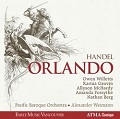 With
two very good versions in the catalogue, from Christopher Hogwood (Decca)
and William Christie (a budget-price 6-CD Warner set, with Alcina)
any newcomer needs to be equally good to survive. This one was recorded
after the Vancouver Festival in 2012, with the period-instrument Pacific
Baroque Orchestra.
With
two very good versions in the catalogue, from Christopher Hogwood (Decca)
and William Christie (a budget-price 6-CD Warner set, with Alcina)
any newcomer needs to be equally good to survive. This one was recorded
after the Vancouver Festival in 2012, with the period-instrument Pacific
Baroque Orchestra.
I still marginally prefer one of the older alternatives but I’d
be perfectly happy to have the new Atma release as my sole version:
singing, direction and recording are all very good. Try the two principal
singers at the end of Act II, tracks 35-38 to judge for yourself: Angelica’s Verdi piante and Orlando’s mad aria, Ah stigie larve.
The 24-bit lossless version is especially good, but costs $42.65; if
you’re happy with mp3 (at 320 kb/s) or 16-bit, the eclassical.com
price of $28.43 compares well with what other download sites are charging
for mp3 only.
Now, if someone were to discover a long-lost recording of Janet Baker
in the title role with Anthony Lewis at the helm, a magic production
which I vividly remember seeing and hearing at Sadler’s Wells in
1966 …
George Frideric HANDEL Ottone, Re di Germania (1723)
Ottone (King of Germany) – James Bowman (counter-tenor)
Teofane (Daughter to Romano, Emperor of the East) – Claron McFadden
(soprano)
Gismonda (Widow of Berengario, a Tyrant in Italy) – Jennifer Smith
(soprano)
Adelberto (Son of Gismonda) – Dominique Visse (counter-tenor)
Emireno (A corsair, but really Basilio, brother to Teofane) – Michael
George (bass)
Matilda (Cousin to Ottone, and promised in marriage to Adelberto) –
Catherine Denley (mezzo)
The King’s Consort/Robert King – rec. 1993. DDD
Pdf booklet with text and translation included.
HYPERION CDS44511/3 [3 CDs: 174:29] – hyperion-records.co.uk (mp3 and lossless)
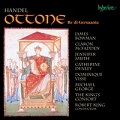 With
the McGegan/Harmonia Mundi recording of similar vintage long deleted,
Hyperion have the catalogue to themselves at the moment, so the reissue
at a lower price – effectively three-for-two – is generous.
With
the McGegan/Harmonia Mundi recording of similar vintage long deleted,
Hyperion have the catalogue to themselves at the moment, so the reissue
at a lower price – effectively three-for-two – is generous.
This is not among my top Handel operas – I have to admit that it’s
a long time since I took out the McGegan set of CDs – but Handel
and Bach even on auto-pilot are better than all their contemporaries.
Actually Ottone is better than that; though it didn’t grab
my attention straight after listening to Orlando, I did very
much enjoy hearing this reissue.
I’ve seen James Bowman’s singing here described as affected
but that didn’t trouble me unduly; try Tanti affani (tr.48),
an aria which Bowman has also recorded separately, again with the King’s
Consort (CDH555370), to see how you react. If you’re happy
with that aria you should be happy with the entire recording.
Franz SCHUBERT (1797-1828) Octet (D803) (1824)
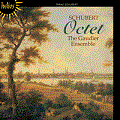 The
Gaudier Ensemble – rec. December 2001. DDD.
The
Gaudier Ensemble – rec. December 2001. DDD.
pdf booklet included
HYPERION HELIOS CDH55460 [59:43] – from hyperion-records.co.uk (mp3 and lossless)
The budget-price reissue makes this even more desirable than when I
recommended it at full price on CDA67339 alongside, but not in
preference to Wigmore Hall Live WHL0017 – April
2012/2. That recording comes with a filler – the beautiful Der Hirt auf dem Felsen – but the lower price of the Hyperion
makes amends for the short-ish playing time. Either of these –
or the other recordings which I mentioned in that earlier review –
will serve to blow away the cobwebs of melancholy.
Franz LISZT (1811-1886)
Hungarian Rhapsodies Nos. 1-6 (orch. Liszt and Franz DOPPLER)
(1858-1860) [70:24]
Orchester Wiener Akademie/Martin Haselböck – rec. October
2012
Pdf booklet included
CPO 777797-2 [70:24] – from eclassical.com (mp3, 16– and 24-bit lossless)
(See reviews by Brian
Reinhart and Rob
Maynard: Recording of the Month.)
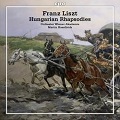 I’ve
encountered Haselböck’s Liszt with the period-instrument Wiener
Akademie before (NCA60246 and 60250 – review).
I was impressed by these performances of the tone poems but not quite
ecstatic, especially by comparison with Masur, and that was my first
reaction when I first heard this CPO recording so at first I was surprised
to see it as Recording of the Month, which prompted me
to listen again. I seem originally to have been so under-whelmed that
I downloaded and listened in July and have only now returned in late
October.
I’ve
encountered Haselböck’s Liszt with the period-instrument Wiener
Akademie before (NCA60246 and 60250 – review).
I was impressed by these performances of the tone poems but not quite
ecstatic, especially by comparison with Masur, and that was my first
reaction when I first heard this CPO recording so at first I was surprised
to see it as Recording of the Month, which prompted me
to listen again. I seem originally to have been so under-whelmed that
I downloaded and listened in July and have only now returned in late
October.
Even now I’m not quite so carried away as my colleagues –
I’m still marginally inclined to prefer Iván Fischer (Philips,
from hmvdigital.com)
– but I can now appreciate what I missed in July. That Fischer
recording is available in mp3 (also in lossless, for a little extra,
from deutschegrammophon.com)
but the clincher that places the CPO top of the pile as a download is
that it’s also available from eclassical.com in 24-bit sound and
that it comes complete with pdf booklet.
Nikolai RIMSKY-KORSAKOV (1844-1908) Scheherazade
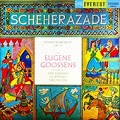 London
Symphony Orchestra/Sir Eugene Goossens – rec. 1958. ADD/stereo
London
Symphony Orchestra/Sir Eugene Goossens – rec. 1958. ADD/stereo
Pdf booklet included
EVEREST SDBR-3026 [42:48] – from iTunes (mp3)
There’s nothing at all wrong with this recording but there’s
nothing special, either, to match the Everest reissues of the Copland
Third Symphony (below) or the Vaughan Williams Ninth (DL News 2013/14).
If I were looking for a recording of this vintage, I’d go unhesitatingly
for Beecham (EMI, now Warner: £5.99 from sainsburysentertainment.co.uk,
mp3) except in one regard: good as the Beecham sounds for its age, the
Goossens has worn even better. Good value at £5.99/$7.99 –
but that’s the same price as the Beecham, which also contains the Polovtsian Dances.
The Art of Ralph VAUGHAN WILLIAMS (1872-1958)
Toward the Unknown Region [12:10]
London Symphony Choirs and Orchestra/Sir Malcom Sargent – rec.
1957 (?)
Symphony No.9 [34:53]
London Philharmonic Orchestra/Sir Adrian Boult – rec. 1958.
Tuba Concerto [12:44]
Philip Catelinet (tuba); London Symphony Orchestra/Sir John Barbirolli
– rec. c.1954.
BEULAH 1PD39 [59:46] – from iTunes and amazon.co.uk (mp3)
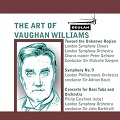 I’m
not sure of the provenance of Toward the Unknown Region –
the recording sounds too thin to have been taken from the HMV LP released
in 1957 – but this early work doesn’t receive too many outings
and Sargent and his team do it justice.
I’m
not sure of the provenance of Toward the Unknown Region –
the recording sounds too thin to have been taken from the HMV LP released
in 1957 – but this early work doesn’t receive too many outings
and Sargent and his team do it justice.
The highlight of this album is the very good transfer of the Ninth
Symphony. Like bananas and London buses, reissues sometimes appear
in bunches – in this case in pairs, with an Everest reissue which
I hailed only a few weeks ago in DL News 2013/14. When Decca, having
recorded all the other symphonies with Boult and the LPO, refused to
do the Ninth, a little-known American company, Everest, did the honours.
The recording took place mere hours after VW’s death and the Everest
reissue includes the brief eulogy which Boult recorded. There would
have been ample space for it here, but maybe it was better to omit it.
Having bought the World Record Club release of this recording, I got
to know this ‘orphan’ symphony well and I’ve always wondered
why Decca missed out on it; I’m pleased now to have a choice of
recordings, with the Beulah less expensive than the Everest reissue
and more easily obtained.
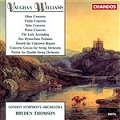 Everest
include no fillers with the symphony so Towards the Unknown Region and the equally neglected Tuba Concerto are bonuses. The latter
appeared on an HMV 10" LP coupled with Evelyn Rothwell’s account
of the Oboe Concerto – at around 20 minutes, could that
not have been fitted on, too, to make a more generous album? Shake off
memories of Tubby the tuba and it’s an enjoyable work in a fine
performance. There are a number of modern recordings, not least on a
Chandos 2-CD set of all VW’s concertante works under the
direction of Bryden Thomson, but this reissue has come up sounding remarkably
well.
Everest
include no fillers with the symphony so Towards the Unknown Region and the equally neglected Tuba Concerto are bonuses. The latter
appeared on an HMV 10" LP coupled with Evelyn Rothwell’s account
of the Oboe Concerto – at around 20 minutes, could that
not have been fitted on, too, to make a more generous album? Shake off
memories of Tubby the tuba and it’s an enjoyable work in a fine
performance. There are a number of modern recordings, not least on a
Chandos 2-CD set of all VW’s concertante works under the
direction of Bryden Thomson, but this reissue has come up sounding remarkably
well.
If you intend to go for the Chandos, at the time of writing one of those
ridiculous anomalies means that the 2-CD set is less expensive than
the download – the former effectively 2-for-1, with no reduction
in price for the download: CHAN9262.
The Previn recording (BMG) seems to be unavailable.
Philip SAWYERS (b.1951)
Violin Sonata No. 1 (1969) [13:46]
Violin Sonata No. 2 (2011) [21:05]
Sir Edward ELGAR (1857-1934)
Violin Sonata in e minor, Op.82 (1918) [26:46]
Steinberg Duo (Louisa Stonehill (violin) and Nicholas Burns (piano))
– rec. January 2013. DDD.
Pdf booklet included
NIMBUS ALLIANCE NI6240 [61:37] – from classicsonline.com (mp3)
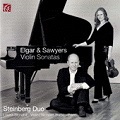 This
is an odd pairing on the face of it, especially when we are not short
of fine versions of the Elgar, more logically coupled – with Finzi
and Walton, for example, on another Nimbus CD (NI5666 – review).
Either way it’s win-win for Nimbus, but I do slightly prefer both
the coupling and the performance, from Daniel Hope and Simon Mulligan,
on that earlier recording.
This
is an odd pairing on the face of it, especially when we are not short
of fine versions of the Elgar, more logically coupled – with Finzi
and Walton, for example, on another Nimbus CD (NI5666 – review).
Either way it’s win-win for Nimbus, but I do slightly prefer both
the coupling and the performance, from Daniel Hope and Simon Mulligan,
on that earlier recording.
If you buy the new recording for the sake of the Elgar but are apprehensive
about the Sawyers couplings, fearing some avant-garde onslaught, let
me set your fears aside. I doubt whether Elgar would have had any problems
relating to the music, which is attractive – often dramatic but
never strident – but I can’t imagine that I’m going to
choose to listen to either work very often. If you want to decide for
yourself, the Steinberg Duo’s performance of the first sonata can
be seen and heard on YouTube – here – and their Canadian premiere of the second sonata – here.
Their Elgar is here.
I do recommend sampling from there or Naxos Music Library – you
may well appreciate all three performances rather more than I’ve
indicated. Having seen and heard those live performances on YouTube,
I’m beginning to wonder if I haven’t under-estimated these
recordings.
If neither the new nor the older Nimbus coupling of the Elgar appeals,
there’s an alternative in the form of a Channel Classics recording
of Elgar, Sibelius and Grieg (Isabelle van Keulen and Robert Brautigam, CC72171 – Recording of the Month – review).
Subscribers to Naxos Music Library can try out all three and all three
can be downloaded from classicsonline.com – but the two Nimbus
recordings are also available on CD at competitive prices from MusicWeb
International.
I’ve left the best till last: if forced to choose a desert island
recording, despite the blandishments of all these fine offerings, I’d
go for a Hyperion Helios recording on which the Nash Ensemble play the
Piano Quintet and the Violin Sonata – an ideal combination of couplings,
performances and budget price (CDH55301). There’s strong
competition in the Quintet from a full-price Hyperion recording –
I compared the two in July
2011/2 – but if the coupling appeals, I repeat my advice to
go for the lower-priced version from hyperion-records.co.uk (mp3 and lossless, with pdf booklet).
Gustav MAHLER (1860-1912)
Symphony No.5 in c-sharp minor
Budapest Festival Orchestra/Iván Fischer – rec. September
2012. DDD/DSD
Pdf booklet included
CHANNEL CLASSICS CCSSA34213 [74:09] – from channelclassics.com (SACD, mp3, 16– and 24-bit lossless and DSD)
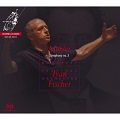
I enjoyed Iván Fischer’s earlier recording of Mahler’s
First Symphony – CCSSA33112, Recording
of the Month – though I was less enthusiastic about
No.4, CCSSA26109 – July
2010 DL Roundup – and my MusicWeb International colleagues
have had similar mixed reactions to some of the other albums.
Be warned that the adagietto of the Fifth is taken slowly –
10:42 in total – that’s not vastly slower than what might
be considered the norm of around ten minutes, but you don’t need
to fully persuaded of the Kaplan theory to lean towards Simon Rattle’s
9:32. Bernstein was slower still, on both CBS (now Sony) and especially
on DG (11:16) – and I readily admit to listening to the latter
performance as my first choice. Fischer makes his tempo work, but there
were moments when I feared that he might lose the thread.
Otherwise this is a strong contender, albeit in a competitive market
which is still headed by Bernstein on mid-price DG (4776334)
– despite that slow adagietto. By comparison Fischer just
fails to catch fire quite as effectively. The 24/96 recording is very
good indeed; the Bernstein is available only in mp3 or 16-bit flac as
a download.
Jean SIBELIUS (1865-1957)
Masonic Ritual Music for tenor, male voice choir and organ, Op.
113 [41:06]
Hannu Jurmu (tenor)
Harri Viitanen (organ)
YL Male Voice Choir/Matti Hyökki
Masonic Ritual Music for tenor and orchestra, Op. 113 (arr. Jaakko
KUUSISTO) (2007) [30:16]
Mika Pohjonen (tenor)
Pauli Pietiläinen (organ)
Lahti Symphony Orchestra /Jaakko Kuusisto
rec. April 2010, Helsinki Cathedral, Finland (original version); May
2008, Sibelius Hall, Lahti, Finland (arrangement)
BIS-CD-1977 [72:05] – from eclassical.com (mp3, 16– & 24-bit flac)
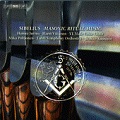 BIS have rendered sterling service to the music of Sibelius with their
incomparable Sibelius Edition, from which the first piece here –
the original version of the Masonic Ritual Music – is taken
(BIS-CD-1936/38). Rob Barnett was complimentary about the performance
in his review.
Despite a 2008 recording date for the Jaakko Kuusisto arrangement this
seems to be the first outing for the piece. Curious listeners may also
wish to investigate the organ-only version, magisterially played by
Kalevi Kiviniemi and superbly recorded by the ever-reliable Mika Koivusalo
(review).
BIS have rendered sterling service to the music of Sibelius with their
incomparable Sibelius Edition, from which the first piece here –
the original version of the Masonic Ritual Music – is taken
(BIS-CD-1936/38). Rob Barnett was complimentary about the performance
in his review.
Despite a 2008 recording date for the Jaakko Kuusisto arrangement this
seems to be the first outing for the piece. Curious listeners may also
wish to investigate the organ-only version, magisterially played by
Kalevi Kiviniemi and superbly recorded by the ever-reliable Mika Koivusalo
(review).
As Andrew Barnett points out in his excellent liner-notes, Sibelius
revised and added to his Op. 113, so various performing permutations
are possible. That said, the version recorded here is a sensible and
authoritative one. What of the music itself? Kiviniemi makes it sound
very grand, but never grandiose, and one senses that Sibelius is in
fine fettle, even at this late stage in his composing career. Listening
to the original version – scored for tenor, male voice choir and
organ – doesn’t dispel or diminish that impression at all.
The opening hymn may not have quite the heft that makes Kiviniemi so
memorable, but Harri Viitanen plays well and the BIS recording is superb.
It’s all very solemn, although I’m happy to say it avoids
somnolence; the perfectly placed tenor Hannu Jurmu’s ringing tones
add to the powerful sense of occasion. The organ sound is full and warm,
and while I miss Kiviniemi’s bold colours and strong contrasts
this account has an intimacy and generosity of spirit that’s most
appealing. As for the YL choir, whom I first heard in a cappella music by Einojuhani Rautavaara, they are in good voice, and their characterful
singing is well caught in what seems to be a most grateful acoustic.
I’m delighted to have heard this version of the Masonic Ritual
Music at last, and I’d urge others – Sibelians or not
– to seek out this recording at once. I see there are others in
the catalogue, but I’d be very surprised if they combined the musical
and sonic virtues in evidence here. As for eclassical, their site is
as straightforward and intuitive to use as ever, and the download process
was quick and painless. That said, I did notice one audible glitch between
tracks; it’s a very brief one though, and the first I’ve encountered
in these well-priced downloads to date.
That’s the good news; now for the not so good news. Placing an
arrangement such as Kuusisto’s immediately after the work from
which it’s derived is fraught with risk. I recommend you don’t
listen to these performances back to back, for on first hearing the
arrangement seems rather bland. It’s certainly proficient and it’s
well played, but it lacks the expressive range and subtleties of the
original. Kuusisto’s valiant attempt at Sibelian sonorities doesn’t
sound very convincing, and at times the music is frankly overblown.
However, listening to the piece on its own is more rewarding; I certainly
liked it more the second time around.
Otherwise the package is well up to the high standards of the house.
I have to smile when I read the breast-beating, hair-tearing laments
of disgruntled SACD fans who say high-res downloads are sonically inferior
and way too expensive. One need only look at what eclassical has to
offer to know they are wrong on both counts. Indeed, I’d be hard-pressed
to tell that these are 44.1kHz originals, such is the sophistication
and range of the recordings. It’s also BIS’s 40th anniversary,
so while Robert von Bahr and I have had our disagreements I do wish
him and his team all the best for the future.
The Sibelius is a real find; Kuusisto’s arrangement is pleasing
but unmemorable.
Dan Morgan
http://twitter.com/mahlerei
Rachmaninov Piano Concertos
Sergei RACHMANINOV (1873-1943)
Piano Concerto No. 1 in f-sharp minor, Op. 1 [26:24]
Sviatoslav Richter (piano)
USSR RTV Large Symphony Orchestra/Kurt Sanderling – rec. Moscow
in 1955
Piano Concerto No. 4 in g minor, Op. 40 [25:52]
Yakov Zak (piano)
Moscow Symphony Orchestra/Kyrill Kondrashin – rec. Moscow, 1954
Rhapsody on a Theme of Paganini, Op. 43 [21:10]
Yakov Zak (piano)
USSR State Symphony Orchestra/Kyrill Kondrashin – rec. Moscow,
1952
Piano Concerto No. 2 in c minor, Op. 18 [30:38]
Lev Oborin (piano)
Radio Orchestra/Alexander Gauk – rec. Moscow, 1947
Piano Concerto No. 3 in d minor, Op. 30 [39:09]
Lev Oborin (piano)
USSR State Orchestra/Konstantin Ivanov – rec. Moscow, 1949
Pdf booklet included
APR RECORDINGS APR6005 [2 CDs for the price of one: 143:13] –
from hyperion-records.co.uk (mp3 and lossless)
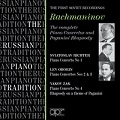 Hyperion,
who offer the best modern recording of these works (Stephen Hough and
Andrew Litton, not available for download), now do us the great favour
of bringing these APR transfers of classic Russian versions. Don’t
expect much of the recordings – even in 1955 Russian LPs were not
the highest of fi and APR admit that the originals left a great deal
to be desired. Nevertheless, they have cleaned the sound up very well
indeed, reducing surface noise on CD1 effectively to zero without diminishing
the frequency range, limited as it is by the original.
Hyperion,
who offer the best modern recording of these works (Stephen Hough and
Andrew Litton, not available for download), now do us the great favour
of bringing these APR transfers of classic Russian versions. Don’t
expect much of the recordings – even in 1955 Russian LPs were not
the highest of fi and APR admit that the originals left a great deal
to be desired. Nevertheless, they have cleaned the sound up very well
indeed, reducing surface noise on CD1 effectively to zero without diminishing
the frequency range, limited as it is by the original.
If you thought the first concerto was a non-starter and even Stephen
Hough doesn’t convince you, Richter and Sanderling ought to do
it, clangourous piano tone and thin orchestral sound notwithstanding.
Similarly, the fourth concerto is as cogent in this performance as the
classic Michelangeli recording (EMI and Beulah). In these two concertos
and the Paganini Rhapsody the sound is tolerable.
I wouldn’t buy this set for the better-known second and third concertos.
Oborin’s performances are good but the 78 sound here is even more
crumbly and with more remaining clicks and plops than the later recordings
of Nos. 1, 4 and the Rhapsody, but this second CD comes as a
bonus, worth an occasional outing.
Cyril SCOTT (1879-1970)
Overture: Pelleas and Melisanda, Op.5 (1900, ed. from MS Martin
Yates) [17:25]
Concerto in D for piano and orchestra, Op.10 (1900, ed. and realised Martin Yates) [30:50]
Concerto for cello and orchestra, Op.19 (1902, completed and revised Martin Yates) [20:53]
Peter Donohoe (piano)
Raphael Wallfisch (cello)
BBC Concert Orchestra/Martin Yates – rec. November 2012. DDD
World premiere recordings
No booklet but brief details from duttonvocalion.co.uk
DUTTON EPOCH CDLX7302 [69:08] – from emusic.com (mp3. c.220-235kb/s)
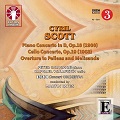 Some
of Martin Yates’ detective work has gone into each of these early
works to varying degrees and all three were well worth both the effort
of rescuing and Dutton’s diligence in placing so much of Cyril
Scott’s music before us. I can’t imagine more persuasive performances
and the recording is very good, too; the emusic.com downloads average
around 230kb/s, which is not far below what iTunes and amazon.co.uk
would offer and, at £2.10 or less, it’s less expensive than
either.
Some
of Martin Yates’ detective work has gone into each of these early
works to varying degrees and all three were well worth both the effort
of rescuing and Dutton’s diligence in placing so much of Cyril
Scott’s music before us. I can’t imagine more persuasive performances
and the recording is very good, too; the emusic.com downloads average
around 230kb/s, which is not far below what iTunes and amazon.co.uk
would offer and, at £2.10 or less, it’s less expensive than
either.
For the ‘regular’ Piano Concertos Nos. 1 and 2 and Early
One Morning (Lyrita SRCD.251, John Ogdon) see review.
For reviews of the Piano Quartet and Piano Quintet (Dutton) and links
to other reviews of downloads of Scott’s music (Lyrita and Chandos),
see DL
News 2013/7.
Aaron COPLAND (1900-1990)
Symphony No.3
London Symphony Orchestra/Aaron Copland
Pdf booklet included
EVEREST SDBR-3018 [40:19] – from iTunes (mp3)
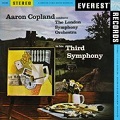 This
is another old friend – like the Vaughan Williams Ninth Symphony
which I reviewed last time, I owned this recording on a World Record
Club LP as an undergrad, c.1963. For all the qualities of other recordings,
notably Leonard Bernstein (CBS/Sony and DG) and James Judd (Naxos) there’s
something very special about Copland conducting his own work and the
recording has come up very well indeed – still little short of
demo quality.
This
is another old friend – like the Vaughan Williams Ninth Symphony
which I reviewed last time, I owned this recording on a World Record
Club LP as an undergrad, c.1963. For all the qualities of other recordings,
notably Leonard Bernstein (CBS/Sony and DG) and James Judd (Naxos) there’s
something very special about Copland conducting his own work and the
recording has come up very well indeed – still little short of
demo quality.
The Everest CD of the Symphony with Billy the Kid, which used
to be available, is selling for over £40 as I write, so the reissue
as a download is very welcome. At just over 40 minutes it’s short
on playing time but the iTunes price of £5.99 compensates –
and I’m pleased to see that the download has broken iTunes’s
former 256kb/s barrier, clocking in at around 285kb/s. Now can we have
that little extra push for 320kb/s or even lossless sound, please?
There’s also a pdf booklet – but why does it print out far
too large to fit a CD case?
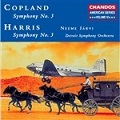
When the Everest recording first appeared via WRC the two most respected
reviewers of the day were at odds over the quality of the music, performance
and recording. I’m on the side of the angels in all three respects.
There was a similar disagreement over the quality of Neeme Järvi’s
recording with the Detroit Symphony Orchestra, coupled with Roy Harris’s
Third Symphony, on Chandos CHAN9474 – from theclassicalshop.net (mp3 and lossless, with pdf booklet). No argument that this coupling
offers the two most significant symphonies by any American composer
but it depends whether you can accept Järvi’s fast tempi in
the Harris – 16:28 overall as against Marin Alsop’s (Naxos)
18:03, but only marginally faster than Leon Botstein whose American
Symphony Orchestra recording on their own label I praised last month.
If you want this logical coupling, hallowed in the past by Leonard Bernstein,
who wasn’t much slower in the Harris, at 17:09, I’d go for
it but you may wish to try via Naxos Music Library first.
Seasonal Recordings
Joy to the World – An American Christmas
 Traditional I wonder as I wander [2.33]
Traditional I wonder as I wander [2.33]
Morten LAURIDSEN O magnum mysterium [6.05]
Traditional Joy to the world [2.25]
It came upon the midnight clear [2.46]
Gustav HOLST In the bleak midwinter [4.36]
William BILLINGS Shepherds, rejoice! [1.52]
Traditional In dulci jubilo [3.07]
Bob CHILCOTT The Shepherd’s Carol [3.28]
Charles IVES A Christmas Carol [2.23]
John RUTTER There is a flower [4.34]
Traditional O little town of Bethlehem [3.25]
Angels we have heard on high [2.55]
Herbert HOWELLS A spotless Rose [3.18]
Hieronymous PRÆTORIUS In dulci jubilo [3.43]
James BASSI Quem pastores laudavere [4.25]
William BILLINGS A virgin unspotted [2.50]
R. L. PEARSALL In dulci jubilo [3.35]
Traditional O little town of Bethlehem [3.29]
Mykola LEONTOVICH Carol of the Bells [1.25]
Handel and Haydn Society/Harry Christophers – rec. January 2013.
DDD
Pdf booklet with texts included
CORO COR16117 [63:02] – from thesixteendigital.com (mp3, aac and 24-bit lossless)
Carols from the Old and New Worlds
 While
Shepherds Watched [4:33]
While
Shepherds Watched [4:33]
The Shepherd’s Star [3:41]
Charles IVES A Christmas Carol [2:55]
Joy to the World! [1:40]
The Apple Tree [2:23]
Christmas Hymn: A Virgin Unspotted [2:41]
Away in a Manger [2:13]
While shepherds watched their flocks by night [1:36]
Hark! The herald angels sing [1:30]
Jean SIBELIUS En etsi valtaa, loistoa [2:45]
Still, O Himmel [2:33]
Süsser die Glocken [2:38]
Weihnachtslied [2:07]
Still, still, still I [2:01]
Gaudete, Christus est natus [1:27]
Personent hodie [1:30]
The Yorkshire Wassail Song [1:45]
HENRY VIII Green grow’th the holly [3:16]
Here we come a-wassailing [2:04]
The Cherry Tree Carol [4:27]
Gustav HOLST In the Bleak Midwinter [3:55]
There is no rose [3:41]
A New Year’s Gift (Greensleeves) [1:48]
A wassail, a wassail throughout all this town! [2:22]
Theatre of Voices/Paul Hillier
HARMONIA MUNDI D’ABORD HMA1957079 [61:31] – from eclassical.com (mp3 and lossless) or stream from Naxos Music Library
Despite a few inevitable overlaps between these two releases, both are
well worth adding to your collection.
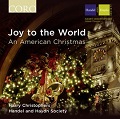 Coro:
this is not the brash affair that you might expect from the Christmas-card
cover; even the pseudo-Handelian Joy to the World receives the
most tasteful performance I’ve ever heard. It contains slightly
more familiar material than the Harmonia Mundi, so it’s a little
less suitable for year-round listening, but there’s some material
that isn’t specifically seasonal or familiar and the presence of
Harry Christophers at the helm of the Handel and Haydn Society lends
it distinction well above the run of the mill. Good recording and the
inclusion of the booklet provide added incentives.
Coro:
this is not the brash affair that you might expect from the Christmas-card
cover; even the pseudo-Handelian Joy to the World receives the
most tasteful performance I’ve ever heard. It contains slightly
more familiar material than the Harmonia Mundi, so it’s a little
less suitable for year-round listening, but there’s some material
that isn’t specifically seasonal or familiar and the presence of
Harry Christophers at the helm of the Handel and Haydn Society lends
it distinction well above the run of the mill. Good recording and the
inclusion of the booklet provide added incentives.
Harry Christophers’ other Christmas recordings with The Sixteen
are also worth revisiting. The following are available from thesixteendigital.com in lossless sound:
• COR16027 Christus Natus est: an early English
Christmas
• COR16034 BRITTEN Ceremony of Carols, etc.
• COR16043 A traditional Christmas Carol Collection I
Classicsonline.com also offer (mp3 only)
• COR16004 Hodie: an English Christmas Collection
• COR16017 BACH Christmas Oratorio
• COR16085 A traditional Christmas Carol Collection II
• COR17003 The Sixteen Christmas Compliation – budget
price sampler
Presumably these will be added to thesixteendigital.com’s lossless
collection in due course. All can be streamed from Naxos Music Library
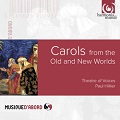 Hillier:
Plenty of distinction here, too, mostly offering less familiar fare:
the very first track is an earlier, now unfamiliar, setting of While
shepherds watched, with another setting on track 8. Other tracks
feature familiar music with unfamiliar words. Since this is not filled
with the umpteenth versions of old favourites, I didn’t find it
uncomfortable to listen to it in late October.
Hillier:
Plenty of distinction here, too, mostly offering less familiar fare:
the very first track is an earlier, now unfamiliar, setting of While
shepherds watched, with another setting on track 8. Other tracks
feature familiar music with unfamiliar words. Since this is not filled
with the umpteenth versions of old favourites, I didn’t find it
uncomfortable to listen to it in late October.
Unfortunately there is no booklet, so no texts and translations, which
are needed at least for track 10, En etsi valtaa, loistoa (I
do not seek power or glory), a setting by Sibelius of a Finnish version
of a Swedish poem. One other word of caution – at $11.07 the download
is hardly competitive with the £5.75 being asked for the budget-price
CD by at least one online supplier. classicsonline.com’s asking
price of £7.99 (mp3, no booklet) is also uncompetitive.
RÓS: Songs of Christmas
 Michael
PRÆTORIUS Det hev ei rose sprunge (Behold, a Rose is
springing)
Michael
PRÆTORIUS Det hev ei rose sprunge (Behold, a Rose is
springing)
Trad No koma Guds englar (The Angels of God)
Instrumental improvisation on Ricercata Segunda by Diego ORTIZ
‘Rós’ – Suite for Christmas devised by Grete
PEDERSEN (tracks marked*):
HILDEGARD of Bingen O vis æternitatis (O eternal
Force) (short version)*
O frondens virga (O leafy Branch)*
Trad Eit barn er født i Betlehem (A Child is born
in Bethlehem)*
HILDEGARD of Bingen Ave, generosa (Hail, Magnanimous)*
Ola O. FAGERHEIM I denne søte juletid (In this
blessed Christmas Time)*
Trad Den fagraste rosa (The Fairest of Roses)*
Trad, after Helge DILLAN/Oskar FOLDEN, arr. Rolf LISLEVAND Maria, hun er en jomfru ren (Mary is a Virgin Pure) (instrumental)*
Mitt hjerte alltid vanker (My Heart forever Dwells)*
HILDEGARD of Bingen O vis æternitatis (O Eternal
Force) (long version)*
Per NØRGÅRD Julens glæde (The Joy of
Christmas)
Trad Et lite barn så lystelig (Christmas Verse)
Gustaf NORDQUIST Jul, jul, strålande jul (Yule,
Yule, radiant Yule)
Berit Opheim (vocals)
Gjermund Larsen (violin)
Rolf Lislevand (lute)
Bjørn Kjellemyr (double bass)
Det Norske Solistkor (The Norwegian Soloists’ Choir)/Grete Pedersen
– rec. April 2013. DSD.
Pdf booklet with texts and translations included
BIS-SACD-2029 [52:30] – from eclassical.com (mp3, 16– and 24-bit lossless)
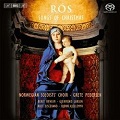 If
you’re looking for something out of the ordinary for Christmas,
this could well be it. Apart from the opening Prætorius setting
and the three works by Hildegard, everything else is likely to be a
voyage of discovery, and a delightful one at that, which need not be
restricted to Christmas listening.
If
you’re looking for something out of the ordinary for Christmas,
this could well be it. Apart from the opening Prætorius setting
and the three works by Hildegard, everything else is likely to be a
voyage of discovery, and a delightful one at that, which need not be
restricted to Christmas listening.
I hadn’t encountered the Norske Solistkor before but I enjoyed
this so much that I now intend to investigate their other recording
for BIS, also available from eclassical.com: White Nights, impressions
of Norwegian folk music (BIS-SACD-1871).
Where comparisons can be made, in the Hildegard with Gothic Voices (Hyperion)
and Sequentia (DHM/BMG) I didn’t find the Norwegian choir lacking,
though I’d still urge listeners to go for A Feather on the Breath
of God (Hyperion CDA66039 or CDS44251/2, 3 CDs) and
one or more of the many recordings which Sequentia have made: a good
place to start would be the selection which was recently reviewed by
Simon Thompson – here.
One small complaint: the original German words of the opening Es
ist ein Ros’ entsprungen are so well known that it seems odd
to have them sung in Norwegian.














